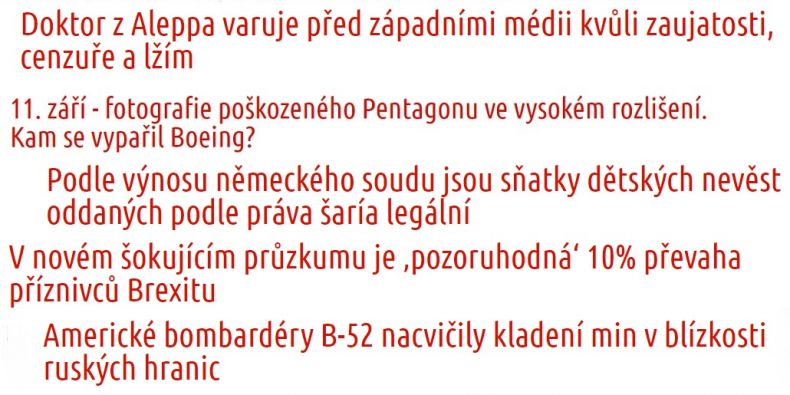Political propaganda is not what it used to be. It has significantly changed in tone, a new analysis of Czech pro-Kremlin websites shows.
With the support of the think-tank Evropské hodnoty (European Values), Masaryk University researchers have tracked articles published by four Czech websites, including the relatively well-known news portal Parlamentní listy (Parliament News).
Research data show that the monitored websites no longer rely on straightforward publicity and adoration. Their propaganda is more sophisticated than that, and it does not respect basic ethical principles of journalism. According to the researchers, such propaganda is therefore becoming more dangerous.
“Generally speaking, there is almost no distinction between news and comment. Authors use emotive language and manipulative techniques – for instance, every fifth article works with negative emotions,” said Petra Vejvodová, a propaganda specialist and assistant professor at the Department of Political Science of the MU Faculty of Social Studies.
Political scientists from Masaryk University have monitored 2,660 articles published in March this year on four Czech websites which researchers say disseminate pro-Kremlin propaganda: Sputnik Česká republika, AC24.cz, Svět kolem nás (The World around Us) and Parlamentní listy (Parliament News). The main criterion for including a website in the research was the overall number of its readers, which is why the well-known website Aeronet was not counted in the study.
According to the report, 40 per cent of the articles examined contain blame, 34 per cent exaggeration and rumour, almost 18 per cent unfounded labelling and around 8 per cent a view of the author which is inappropriate for this form of journalism. These results show that journalistic work performed for the monitored websites is very poor and conduct improper.
The monitored websites are not, however, working with primitive propaganda on behalf of the Kremlin and its representatives. Readers can find in them neither fake photos nor videos, as are often used for purposes of propaganda. The practices named in the previous paragraph create the impression that something is awry with the current Czech political system. The pro-Russia tendencies of the websites are most visible in how they refer to different topics; the war in Syria and the conflict in Ukraine are mostly relativized, for instance.
Surprise: Manipulation by Parlamentní listy
The researchers have also revealed a surprising fact about the news portal Parlamentní listy. While the three other websites mentioned refer to their sources in 75 per cent of articles, only 40 per cent of articles published by Parlamentní listy acknowledge their sources.
“The website Parlamentní listy is usually seen as being located somewhere on the border between respectable media and the so-called grey zone of pro-Kremlin manipulation, but our research data show that the news portal contains articles similar to those that appear on the AC24 portal, and that it actually makes greater use of manipulative techniques than Sputnik, for example. This is a real problem, because Parlamentní listy is perceived and used by many Czech politicians as a standard media channel,” said Miloš Gregor, a political scientist and a member of the research team.
Analysis of techniques of manipulation employed by selected Czech websites, a main topic of the research, is becoming more important for the Czech national security services, too. The Ministry of the Interior of the Czech Republic has announced that a new Centre for the Fight against Terrorism and Hybrid Threats will be established at the end of the year, and the research data could be used by one of its teams. Scientists from Masaryk University are now planning an analysis of selected social media.
